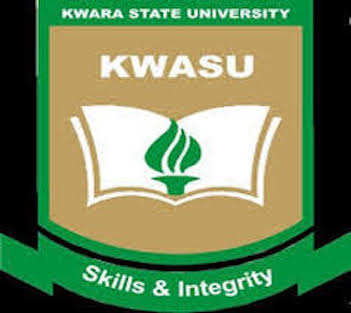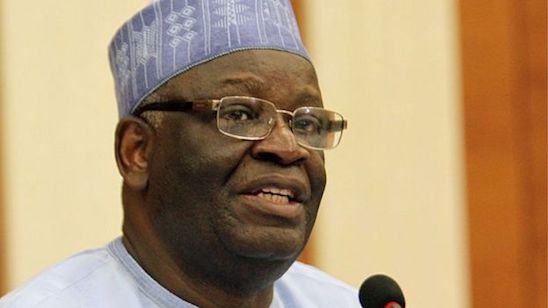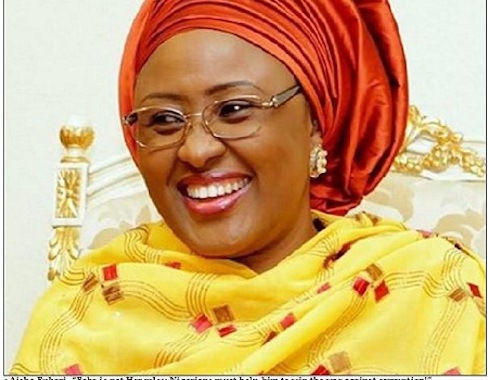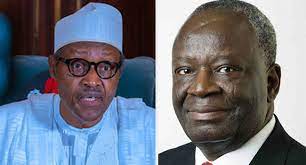COVER
Kwara Varsity to Honor Aisha Buhari, Gambari, Five Others

From Alfred Babs, Ilorin
Kwara State University (KWASU), Malete, said it will confer Honorary Degrees on the wife of the President, Mrs Aisha Buhari, and the Chief of Staff to the president, Prof. Ibrahim Gambari, during the combined 8th and 9th convocation ceremony of the institution.
Vice Chancellor of the institution, Prof.
Mustapha Akanbi, made the disclosure yesterday while briefing newsmen on the programme of activities for the combined convocation ceremony.According to Prof. Akanbi, others to be honoured are KWASU Chancellor, Dr John Bamidele, Dr Muhammadu Indimi, Alhaji Abdulsamad Rabiu, Alhaji Kamoru Yusuf and Mr Babatunde Omotowa.
“These individuals are being honoured for their contributions to national development in their various endeavours.
“Mrs Buhari will be honoured with Doctor of Entrepreneurship, Prof. Gambari, Doctor of Letters, Dr Adewumi and Alhaji Yusuf with Doctor of Technology, Alhaji Rabiu, Doctor of Business and Mr Omotowa with a Doctor of Science degree.
“The honorary Degrees will be conferred on them during our convocation for Doctorates and Masters graduands on Saturday, Dec. 11,” the Vice Chancellor said.
He added that the school produced 98 First-Class graduates out of the 6,620 students that graduated in the 2019/2020 and 2020/2021 academic sessions.
Prof. Akanbi said 3,864 of the students were for the 2019/2020 session while 2,756 were for the 2020/2021 session.
“In addition, we are graduating 321 students for higher degrees in 2019/2020 session and 96 in the 2020/2021 session.
“Due to the prevailing situation with respect to COVID-19, all the ceremonies will be conducted in Hybrid Mode – virtual and physical.
“Therefore, only First-Class graduands, a few Second class Upper graduands and prize winners will be allowed into the University’s Mini Convocation Arena for the conferment of first degrees on Friday, Dec. 10.
“On Saturday, Dec. 11, all Doctorates and few Masters’ degree graduands will be allowed physical presence at the ceremony,” the Vice Chancellor said.
On academic growth of the institution, Prof. Akanbi said eight programmes earned full accreditation status in 2020 while nine programmes went through resource visitation by the National Universities Commission during the 2020/2021 session.
In terms of discipline, the Vice Chancellor said between 2019/2020 and 2020/2021 academic sessions, 87 students were expelled from the University.
”The students were involved in examination malpractice, drug-related offences, internet fraud, robbery, among other anti-social behaviours,” he said.
Prof. Akanbi, however, called on the state government to restore the institution’s subvention as all its activities have been funded through internally generated revenue.
”Our departments are run with fewer staff in spite of the expanding student population.
”The university has 39 academic departments and 53 programmes, so it is our hope that subvention is restored soon by the government and more academic staff recruited for departments to enable them grow. (NAN)
COVER
Yahaya Bello to Spend Christmas, New Year in Kuje Prison

By Mike Odiakose, Abuja
Immediate past governor of Kogi State, Yahaya Bello will spend the 2024 Christmas and 2025 New Year days in Kuje prison, Abuja, following refusal of his bail application by the Federal Capital Territory High Court.
Justice Maryann Anenih yesterday adjourned the case until Jan.
29, Feb. 25, and Feb. 27, 2025 for the continuation of the hearing.The former governor is standing trial, along with two others, in an N110 billion money laundering charge brought against him by the Economic and Financial Crimes Commission (EFCC).
Justice Anenih had refused to grant a bail application filed by Bello, saying it was filed prematurely.
The judge admitted Umar Oricha and Abdulsalam Hudu, to bail in the sum of N 300 million each with two sureties.
Justice Anenih, while delivering a ruling said, having been filed when Bello was neither in custody nor before the court, the instant application was incompetent.
“Consequently, the instant application having been filed prematurely is hereby refused,” she said.
Recalling the arguments before the court on the bail application, the judge had said, “before the court is a motion on notice, dated and filed on Nov. 22.
“The 1st Defendant seeks an order of this honourable court admitting him to bail pending the hearing and determination of the charge.
“That he became aware of the instant charge through the public summons. That he is a two-term governor of Kogi State. That if released on bail, he would not interfere with the witnesses and not jump bail.”
She said the Defendant’s Counsel, JB Daudu, SAN, had told the court that he had submitted sufficient facts to grant the bail.
He urged the court to exercise its discretion judicially and judiciously to grant the bail.
Opposing the bail application, the Prosecution Counsel, Kemi Pinheiro, SAN, argued that the instant application was grossly incompetent, having been filed before arraignment.
He said it ought to be filed after arraignment but the 1st Defendant’s Counsel disagreed, saying there was no authority
“That says that an application can only be filed when it is ripe for hearing.”
Justice Anenih held that the instant application for bail showed that it was filed several days after the 1st defendant was taken into custody.”
Citing the ACJA, the judge said the provision provided that an application for bail could be made when a defendant had been arrested, detained, arraigned or brought before the court.
Bello had filed an application for his bail on November 22 but was taken into custody on November 26 and arraigned on Nov. 27.
COVER
Middle Belt Group Tasks FG on Resettlement, Safety of IDPs

From Jude Dangwam, Jos
Conference of Autochthonous Ethnic Nationalities Community Development Association (CONAECDA) has called on the federal government to intensify efforts in the resettlement of displaced persons in their ancestral homes.
The organization made this call at the end of its conference held in Jos, the Plateau State Capital weekend.
Thirty resolutions were passed covering security, economy, politics, governance, culture, languages, human rights and indigenous peoples’ rights among others.
The Conference President, Samuel Achie and Secretary Suleman Sukukum in a communique noted that the conference received and discussed reports from communities based on which resolutions were reached on securing, reconstruction, rehabilitation and returning communities displaced by violence across the Middle Belt.
“After considering the reports from communities displaced by violent conflicts, conference resolved, and called on government to focus on providing security to deter further displacements.
“Call on government to provide security to enable communities to return. Government and donor partners should assist in reconstructing and returning displaced communities,” the communique stated.
The GOC 3 Armoured Division Nigeria Army represented by Lt Col Abdullahi Mohammed said the Nigerian Army is committed to working closely with communities to achieve a crime-free society, urging communities to support them with credible information.
“Security is a collective effort, and we cannot do it alone, the community plays a crucial role in ensuring safety.
“We urge everyone here not to shield or protect individuals involved in criminal activities. Transparency and collaboration, together, with maximum cooperation, we can achieve peace, security, and prosperity for our society,” the GOC stated.
The National Coordinator of CONECDA, Dr. Zuwaghu Bonat in his address at the gathering noted that the theme of this year’s program, Returning, Resettling, and Rehabilitating Displaced Communities, was chosen as a wakeup call on the federal government.
He maintained that the organization is aware that President Bola Tinubu has expressed a commitment to ensuring that displaced communities return to their ancestral lands.
He said similarly, some state governments, including Plateau State, have set up committees to address the lingering matter.
The coordinator however cautioned, “It is critical that we avoid generalizations or profiling. For instance, Not all Muslims are involved in terrorism. The overwhelming majority of Muslims in Nigeria are peaceful and reject extremist ideologies.
“We also know that some terrorists exploit religion to mobilize support or rationalize their actions. However, their atrocities – slaughtering women, cutting open pregnant mothers, and killing children show a profound disregard for humanity and God. Normal human beings would not commit such acts.
“We must also be cautious about lumping banditry with terrorism. While statistics indicate that many bandits and kidnappers may share similar ethnic backgrounds, kidnapping has now evolved into a profit-driven enterprise. This distinction is vital to address the root causes effectively,” he stated.
The Governor of Plateau State, Caleb Mutfwang represented by his Senior Special Assistant (SSA) on Middle Belt Nationalities, Hon Daniel Kwada noted that the conference was apt to addressed the various underlying issues bedeviling the region and its people.
“We in the Middle Belt have long been standing at the crossroads of Nigeria’s complex history. Despite our tireless efforts to stabilize this nation, we have faced immense challenges, including underdevelopment, security issues, and marginalization.
“Often, we are unfairly maligned, but gatherings like this offer a chance to change the narrative.
“Such conferences set the tone for better discussions. They allow us to drive processes that bring development, ensure security, and elevate our people to greater heights,” Mutfwang noted.
COVER
Recapitalisation: SEC Charges Banks to Strengthen Corporate Governance

Securities and Exchange Commission (SEC) has called on banks to reinforce their corporate governance principles and risk management frameworks to boost investor confidence during the ongoing recapitalisation exercise.
Dr Emomotimi Agama, Director-General, SEC, said this at the yearly workshop of the Capital Market Correspondents Association of Nigeria (CAMCAN) held in Lagos.
The theme of the workshop is: “Recapitalisation: Bridging the Gap between Investors and Issuers in the Nigerian Capital Market”.
Agama, represented by the Divisional Head of Legal and Enforcement at the SEC, Mr John Achile, stated that the 2024–2026 banking sector recapitalisation framework offers clear guidance for issuers while prioritising the protection of investors’ interests
He restated the commission’s commitment towards ensuring transparency and efficiency in the recapitalisation process.
The director-general stated that the key to bridging the gap between issuers and investors remained the harnessing of innovation for inclusive growth.
In view of this, Agama said, “SEC, through the aid of digital platform, is exploring the integration of blockchain technology for secure and transparent transaction processing to redefine trust in the market.”
He added that the oversubscription of most recapitalisation offers in 2024 reflects strong investor confidence.
To sustain this momentum, the director-general said that SEC had intensified efforts to enhance disclosure standards and corporate governance practices.
According to him, expanding financial literacy campaigns and collaborating with fintech companies to provide low-entry investment options will democratise access to the capital market.
He assured stakeholders of the commission’s steadfastness in achieving its mission of creating an enabling environment for seamless and transparent capital formation.
“Our efforts are anchored on providing issuers with clear guidelines and maintaining open lines of communication with all market stakeholders, reducing bureaucratic bottlenecks through digitalisation.
“We also ensure timely review and approval of applications, and enhancing regulatory oversight to protect investors while promoting market integrity,” he added.
Agama listed constraints to the exercise to include: addressing market volatility, systemic risks, limited retail participation as well as combating skepticism among investors who demand greater transparency and accountability.
He said: “We are equally presented with opportunities which include leveraging technology to deepen financial inclusion and enhance market liquidity.
“It also involves developing innovative financial products, such as green bonds and sukuk, to attract diverse investor segments.
“The success of recapitalisation efforts depends on collaboration among regulators, issuers, and investors.”
Speaking on market infrastructure at the panel session, Achile said SEC provides oversight to every operations in the market, ranging from technology innovations to market.
He stated that the commission is committed to transparency and being mindful of the benefits and risks associated with technology adoption.
Achile noted that SEC does due diligence to all the innovative ideas that comes into the market to ensure adequate compliance with the requirements.
On the rising unclaimed dividend figure, Achile blamed the inability of investors to comply with regulatory requirements and information gap.
He noted that SEC had done everything within its powers to ensure that investors receive their dividend at the appropriate time.
He, however, assured that the commission would continue to strengthen its dual role of market regulation and investor protection to boost confidence in the market.
In her welcome address, the Chairman of CAMCAN, Mrs Chinyere Joel-Nwokeoma, said banks’ recapitalisation is not just a regulatory requirement, but an opportunity to rebuild trust, strengthen the capital market, and drive sustainable growth.
Joel-Nwokeoma stated that the recent recapitalisation in the banking sector had brought to the fore the need for a more robust and inclusive capital market.
She added that as banks seek to strengthen their balance sheets and improve their capital adequacy ratios, it is imperative to create an environment that fosters trust, transparency, and cooperation between investors and issuers.
The chairman called for collaboration to bridge the gap between investors and issuers to create a more inclusive and vibrant Nigerian capital market.She said: “we must work together to strengthen corporate governance and risk management practices in banks, enhance disclosure and transparency requirements for issuers.” NAN
























